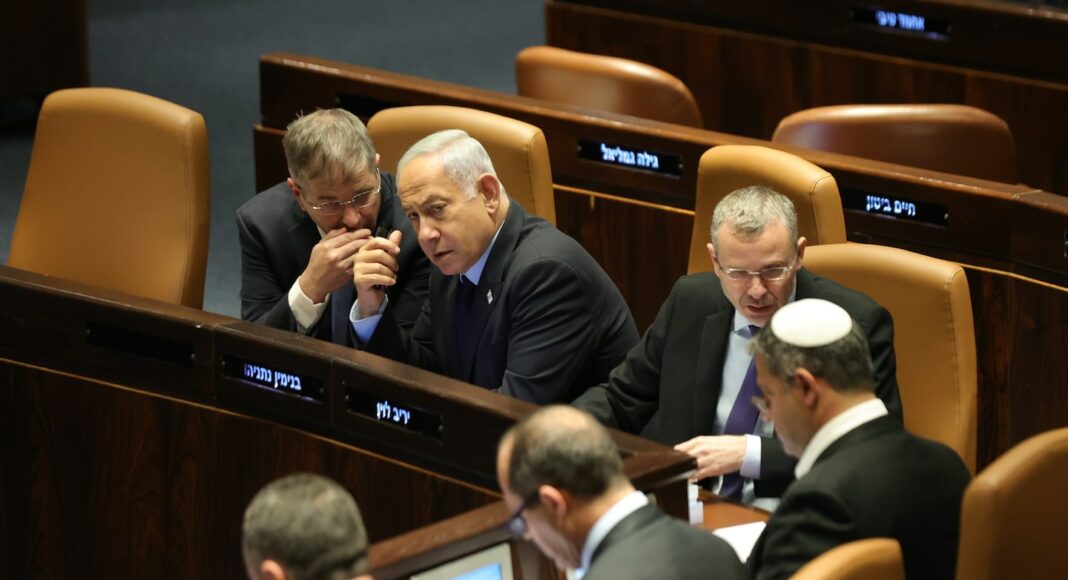Ειδήσεις Ελλάδα

Comment on this story
Comment
TEL AVIV — Israeli Prime Minister Benjamin Netanyahu said Thursday night that he will become personally involved in efforts to put major sections of a controversial judicial overhaul to a vote in the Knesset next week, following yet another day of anti-government protests across the country.
“In order to prevent a rift in the nation,” Netanyahu said in a televised address, he will shepherd the bills through Israel’s parliament over the objections of the attorney general, who has warned that such a move would constitute a conflict of interest due to Netanyahu’s ongoing corruption trials.
Netanyahu claimed that the legislative blitz — including a law passed early Thursday that would make it more difficult to remove sitting prime ministers from office — was for the good of the nation. But in a statement, Israel’s protests leaders said the speech showcased a “dictator-in-the-making, who instead of stopping the legal coup, decided to continue with the hostile political takeover of the Supreme Court.”
In the face of unprecedented backlash, Netanyahu’s coalition has steadfastly pressed forward with the legislation, which would give the government more power to override Supreme Court decisions and select judges.
Mass demonstrations have raged across the country for nearly three months, with protesters condemning the judicial overhaul as a power grab that would dismantle Israel’s system of checks and balances. On Thursday, hundreds of thousands of Israelis took to the streets again, including large numbers of active-duty military reservists, blocking city intersections and rallying outside the homes of the right-wing ministers involved in advancing the bills.
Nearly 100 people were arrested nationwide during clashes with police, who have used officers on horseback, water cannons and other unusually aggressive tactics under the direction of far-right national security minister Itamar Ben Gvir.
Several of Netanyahu’s own allies, including a previous head of the Mossad, said the proposals threatened to tear the country apart. And members of the country’s revered military have taken the unusual step of joining the protests. Hundreds of reservists recently pledged to boycott training missions until the legislation was pulled.
“We’re about to cross a red line,” said Tomer Naveh, 52, a reservist of more than 30 years, at a demonstration Thursday near the Tel Aviv headquarters of Israel’s military. “This is a genuine threat of Israel becoming a dictatorship.”
Internationally, too, criticism has been mounting. In a phone call this week, President Biden stressed to Netanyahu the importance of “genuine checks and balances” in democratic societies.
Israeli President Isaac Herzog has hosted negotiations between the government and the opposition, and has warned repeatedly that the national crisis could snowball into a “civil war.” But the deadlock has only spurred the government to fast-track its remaking of the courts.
“We must not reach bloodshed, violence and incitement, even if we have differences of opinion,” said Netanyahu’s wife, Sara, in a rare statement Thursday. “I call on everyone to calm down and work together for a broad consensus among the people of Israel.”
Police were on high alert ahead of a nighttime march planned in the predominantly ultra-Orthodox city of Bnei Brak, home to several high-ranking ministers.
As the turmoil has escalated in recent weeks, and several high-profile high tech companies announced they would move money and operations out the country, cracks have begun to appear in Netanyahu’s Likud party.
“If the doomsday economic prophecies come true, then Likud is done for,” Da Bitan, a member of the Knesset from Netanyahu’s party, said in a recent television interview. “There are at least five Likud members who are in favor of stopping the legislation.”
Before he spoke Thursday, Netanyahu summoned Defense Minister Yoav Gallant. Gallant had warned the prime minister that he was prepared to resign if the judicial project was not paused or abandoned, according to Israeli media.
But Netanyahu gave no indication that he was feeling the pressure: “We want a balanced court, a court of the people,” he said. “It’s not the end of democracy, it’s strengthening democracy.”



